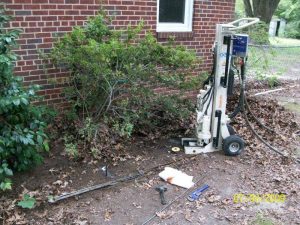
- Image by Here in Van Nuys via Flickr
I was showing some homes today in Oakton, Virginia that were built in the mid 1970’s and commented to my client, as I always do, that a home had been converted to natural gas heat. In the 1970’s there was a moratorium regarding laying new natural gas pipelines in Fairfax County, VA and I always share that story. The point of this post isn’t if this is a true story or not, because I have heard it for years so I will refer to it when discussing heating systems in the area using natural gas, electricity, geothermal or heating oil.
Oakton is one of those sections of Fairfax County where suburban sprawl comes to an abrupt halt and the woods return. The fact that most of Oakton does not have a public sewer system, but individual septic systems, quickly limits what could and can be built. And that is a key part of Oakton’s appeal: a wooded countryside yet minutes to Tyson’s Corner, Reston, Dulles or the Vienna Metro Rail to D.C. My clients who live there were drawn by the “country-feel” of the place.
Many of the homes built in Oakton, VA in the 1970’s were heated using heating oil. Tanker trucks still come through the neighborhoods filling up tanks located either in basements or buried underground in the yard.
Here is the important issue: what condition is that underground oil tank in?
Tanks in a home’s basement can be easily inspected for leaks or sludge, and cut up and removed from the property if necessary in a short time.
 But the underground oil tank really requires some investigation by an environmental engineering firm. Having the proper paperwork from the Virginia Department of Environmental Quality is essential because when you buy the house then you become a responsible party if there is a future leak contaminating the soil. John Pollard of Pollard Environmental, LLC uses a “Geoprobe” to test the ground for contamination by taking soil samples around the underground tank and testing for oil residue.
But the underground oil tank really requires some investigation by an environmental engineering firm. Having the proper paperwork from the Virginia Department of Environmental Quality is essential because when you buy the house then you become a responsible party if there is a future leak contaminating the soil. John Pollard of Pollard Environmental, LLC uses a “Geoprobe” to test the ground for contamination by taking soil samples around the underground tank and testing for oil residue.
Having an environmental testing contingency is not a part of the Regional Sales Contract, but most builders who buy older homes as tear-downs always include a “feasibility study” period where they can do environmental testing so they don’t get stuck buying a potential Superfund site. I always ask, “if there is any paperwork available?” It is not rude and is actually quite a reasonable request. If nothing is on hand, then adding a short testing period contingency can go into paragraph 34 of the Regional Sales Contract.
I always look at home inspections as money well spent since buyers typically learn a ton about the house and can plan for future replacements. And having an inspection by an EPA certified environmental engineer when there is an existing or abandon fuel oil tank is money well spent too because if there needs to be a renegotiation then it should happen now, and not in court years from now. And that is another example why working with an experienced buyer agent (like me) is critical when buying the right house.
For more of my Buyer Agent thoughts, use the buyer agent tab below.
Related articles by Zemanta
- A driving lesson for Northern Virginia home buyers (dougfrancis.com)
- McLean, VA | My Buyer Agent pick of the week… advice! (dougfrancis.com)


